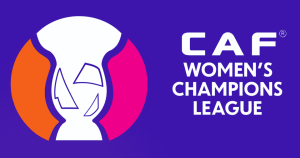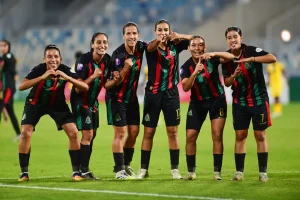By Harry Awurumibe,A frica’s No.1 Women Football Journalist
 Nigeria may be a top country in women’s football in Africa, but that is only at the national team level as the performance of her clubsides in the Five-year old continental club competition named CAF Women’s Champions League (CAFWCL) is nothing to write home about as clubs from South Africa, Morocco, Egypt, Democratic Republic of Congo, Senegal, Ghana and Tanzania have performed far better in the annual competition than the women’s football clubs in Nigeria.
Nigeria may be a top country in women’s football in Africa, but that is only at the national team level as the performance of her clubsides in the Five-year old continental club competition named CAF Women’s Champions League (CAFWCL) is nothing to write home about as clubs from South Africa, Morocco, Egypt, Democratic Republic of Congo, Senegal, Ghana and Tanzania have performed far better in the annual competition than the women’s football clubs in Nigeria.Just last Friday in Egypt, Moroccan club, ASFAR was crowned champions of Africa after edging ASEC Mimosas of Abidjan, Cote d’Ivoire, 2-1 in a tight final
played at the Suez Canal Stadium in Ismaila.
The Moroccan giants, champions in 2022 and finalists last season, completed their redemption in dramatic fashion to lift their second continental crown.
The victory now placed ASFAR alongside Mamelodi Sundowns as the only clubs to have won the tournament twice, further cementing their status among the continent’s elite.
TP Mazembe of DR Congo has won the coveted trophy once in five years of the history of the competition.
Also, by this win, ASFAR has secured a spot in the 2026 FIFA Women’s Club World Cup Play-off, underlining Morocco’s growing stature and continued investment in women’s football within a period of 11 years Fouzi Lekjaa has been the president of the Royal Moroccan Football Federation (FRMF).
As stated earlier, aside from ASFAR, Mamelodi Sundowns Ladies football club financed by South African billionaire and the current CAF President, Dr. Patrice Motsepe won the CAFWCL trophy twice in 2021 and 2023 and also finished as runner-up in 2022.
In contrast, the so-called “Giant of Africa” Nigeria has not been able to produce a clubside that has been to mount a challenge for the CAFWCL trophy just the country has failed to produce a representative in two editions in Cote d’Ivoire 2023 and Egypt 2025 respectively.
Worse still, Nigeria’s representatives in the first edition, Rivers Angels of Port Harcourt, finished a distant 6th position out of eight clubs in 2021, and in 2022, Bayelsa Queens finished in the 3rd place on the log while Edo Queens of Benin City ended up in the 4th place in the 2024 edition.
A closer look at the overall performance of the Nigerian clubs in the newly introduced club football competition in Africa showed that either the standard of the Nigeria Women Football League (NWFL) is not up to a scratch or there is something fundamentally wrong in the administration of women’s football in Nigeria.
Time was when Nigeria women’s football league attracted foreign players to the country’s clubs like Princess Bola Jegede Babes FC of Lagos; Ufuoma Babes FC of Warri; Rivers Angels of Port Harcourt; Pelican Stars of Calabar to mention just a few clubs.
Many players from neighbouring Ghana, Cameroon, Sierra Leone, Liberia, Benin Republic, and Togo, among others, plied their trades in Nigeria as part of deliberate efforts to learn from a more developed league in Africa.

ASFAR of Morocco
However, the reverse is the case presently as several Nigerian players play their club football outside the country as was seen in the just concluded CAFWCL in Egypt where no fewer than four Nigerians were in the thick of actions including the three Nigerian players who featured for TP Mazembe that won the 3rd place match against FC Maser FC of Egypt that also had a Nigerian Alice Ogebe in its fold.
Three Nigerian players with TP Mazembe are Rosemary Adesina, Glory Edet, and Yemisi Samuel even as three others in the Egyptian women’s football league who have scored 22 goals each in the Egyptian women’s league are Agoh Chinaza Favour of ZED FC, Charity Reuben of Al Ahly FC and Fajobi Yetunde Atinuke of FC Zamalek.
Unfortunately, 34 years after organised women’s football debuted in Nigeria and 27 years after the West African nation won the maiden CAF Women’s Africa Cup of Nations (WAFCON), clubs that produced the national team players cannot compete amongst the best clubs in Africa.
It is more devastating when it is realised that a women’s football aficionado and one of the African veteran sports journalists, Mr. Harry Awurumibe was amongst a select group of women’s football stakeholders who were approached by CAF during the 2018 WAFCON in Ghana to make inputs for the proposed CAFWCL.
Awurumibe’s suggestions on the modalities and scope of the new competition at the meeting held in Accra, Ghana and which was presided over by the former Director of Development were adopted by CAF, and in 2021, CAFWCL made its debut and has continued to wax stronger as expected to date.
Regrettably, the expectations that Nigerian clubs will dominate the new competition have since evaporated like the early morning dews as clubs from North, South and East African countries of Morocco, Egypt, South Africa, and DR Congo through ASFAR, FC Masar, Mamelodi Sundowns Ladies and TP Mazembe.
Yet, both the leadership of the Nigeria Football Federation (NFF) and NWFL have not seen anything wrong in the country of over 200 million people who have been playing organised women’s football for the past 34 years not been able to produce a clubside that has made any meaningful impact in the competition in the three past editions clubs from Nigeria featured in the CAFWCL.
Perhaps the inability of the NWFL to produce very formidable clubs that could compete favourably in Africa, accounted to the reasonl only few players from the NWFL make it to the present Super Falcons squad as 99% or even 100% foreign-based players are invited to camp especially during the reign of the immediate past coach of Super Falcons Randy Waldrum who went to major competitions including WAFCON, FIFA Women’s World Cup and Olympic Games with only foreign-based players.
Furthermore, unlike in the early years of the development of women’s footbal in Nigeria when corporate sponsorships and endorsements of clubs and players were the order of the day, the NWFL has no sponsors for several years now.
Specifically, it is indisputable that since beverage giants Pepsi ended its five-year multi million sponsorship of the Female Football League, Super 6 and Female Challenge Cup from 1997 to 2001, neither the past nor present NWFL Management/Board and parent body NFF has been able to attract any corporate sponsor for the women’s league.
More troubling is the fact that the field of participating clubs in the league have continued to shrink as the NWFL has significantly reduced from 42 clubs in the 1990s to 2000s to 16 which are further divided into two with eight clubs in a group and playing only 12 matches per team in a season.
For this reason, the clubs in Nigeria today play fewer games in a season, a situation which have made any club from the country participating in the CAFWCL very vulnerable to be knocked out in the early stage of the competition because they have not played alot of matches in the season in order to be well prepared for the continental club competition.
Worse, the second tier league, the 20-club competition called Championship League and 150- team States League have been in comatose and life-support for so long as those running the NWFL in the past decade have failed to attract any corporate sponsorship despite the huge promises they made prior to landing the top post with the ultimate aim of being made an NFF Executive Committee Member.
Expectedly, this ugly state of affairs of women’s football league in Nigeria and the unprofessional ways of running the league coupled with the country’s economic hardships, have made it difficult for them to follow the NWFL Calendar of Activities.
As it stands, it is near impossible for the new women’s league to start before Christmas day because of the huge logistics involved in it even as other leagues in Africa are up and running.
With the above scenario and the haphazard ways of running the NWFL in the past11 years, it will take a long time for a Nigerian club to break the jinks of lifting the CAFWCL with Edo Queens of Benin City which finished in the 4th place in the 2024 edition in Morocco 4th CAF WCL in Morocco while the Prosperity Girls (Bayelsa Queens) are the only clubside from Nigeria to winning a Bronze Medal in the competition.
The greatest undoing of Nigeria football administrators is the erroneous belief that everything is going well with the country’s football, especially the various football leagues, although the results clearly show that Nigerian clubs in both men and women’s club competitions in Africa can not compete on and off the field with their counterparts from South Africa, Morocco, Egypt, DR Congo, and even from Tanzania.
This is the reality at hand even as this trend portends danger for the continued dominance of African women’s football by the
senior women’s football team of Nigeria (Super Falcons) ahead of the 2026 WAFCON holding in Morocco as the likes of the former African champions South Africa, Zambia, Ghana, and host country Morocco, will fight with Nigeria for the four African tickets for the FIFA Women’s World Cup finals in Brazil later in 2026.
Indeed, it is now a matter of time before Nigeria’s iron grip on the CAF Women’s Team of the Year will be tested, and WAFCON title, too.
 Sports Revelation Online ..breaking authenic sports reports
Sports Revelation Online ..breaking authenic sports reports